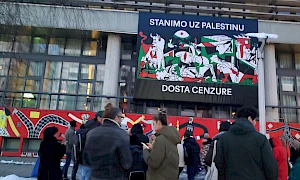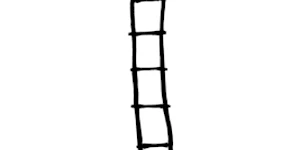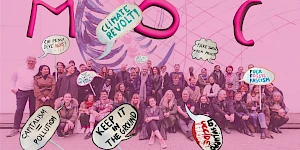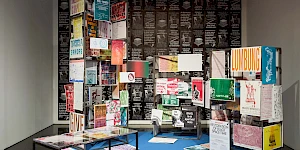Open Call – School of Common Knowledge
MSU (Zagreb), Van Abbemuseum (Eindhoven), MG+MSUM (Ljubljana), ZRC SAZU (Ljubljana) and L'Internationale invite applications for the new School of Common Knowledge (SCK) to be held in Zagreb and Ljubljana 24–29 May 2024. The School of Common Knowledge draws on the network, knowledge and experience of the L’Internationale museum confederation. Its ambition is to be both nomadic and situated, looking at specific cultural and geopolitical situations while exploring their relations and interdependencies with the rest of the world. The SCK is built on the basis laid by the Glossary of Common Knowledge project initiated by Zdenka Badovinac and Moderna galerija (Ljubljana) and continues its co-learning methodology.
This first pilot gathering of the SCK in Zagreb and Ljubljana will shape the future development of the project. It is planned as a six-day programme that offers an intensive experience of the possibilities of art in the 21st century through discussion, action, affection and reflection.
Participants are invited from art, design, architecture and curating but also from related fields such as sociology, political science and anthropology. One can be at any stage in one’s academic or professional career. One should be prepared to contribute one’s own experiences, thoughts and project proposals as well as listen to others.
The pilot programme will speak from central Europe and the western Balkans. The region has created and sustained specific ways of responding to and against globalisation and political hegemonies, as well as alternative ways of engaging with other parts of the world. Unique social models and imaginaries developed here, together with the region’s particular relations to coloniality and imperiality, are useful to reconsider in the light of present conflicts. The programme will offer ways to explore these topics through the voices and experiences of artists and cultural workers grounded in decolonial practices.
The curriculum for this pilot programme will focus on two proposals:
–Exploring situated organisations as actors in the (art) world and as sites from which to speak about translocal connections. The programme will challenge universalism and globalism in culture as forces that serve particular class and cultural interests.
–Investigating and co-learning how to resist and transform the alliance of neo-liberal and neo-fascist forces that have established huge influence in world politics and its military, economic and cultural policies.
The SCK will have access to the collections of the Museum of Contemporary Art in Zagreb, and Moderna galerija in Ljubljana, which largely contain works by artists from the Balkans and the wider Eastern European region. Similarly, the social and political histories of socialist Yugoslavia and the Non-Aligned Movement will be addressed. We will explore decolonisation, anti-fascist struggles and anti-war narratives up to today. A number of situated organisations and individuals from the Balkan region will narrate their practices of cultural production and the possibilities that emerge from them. Many of these organisations were shaped by post-war experiences in the 1990s and can therefore directly reflect on anti-war and peace initiatives today.
The school will engage in different co-learning practices including lectures; visits to exhibitions, collections and archives; walks and physical exercise; site-related experiences; and times of silence. Learning from the Glossary of Common Knowledge, participants will be invited to propose terms and referential fields that will help us to understand the present and suggest ways to generate collective agency. The ambition is to build a small temporary community that can learn to trust and antagonize each other through exchange and shared experiences.
Participation is free. A contribution of €250 per participant will cover all lunches, dinners and travel from Zagreb to Ljubljana and back. Travel to Zagreb and accommodation in both cities will need to be covered by applicants themselves. Lectures and workshops will be held in English. Please send a biography and a short (500 word max.) motivation letter by 10 March to: APPLICATION. Successful applicants will be informed by 20 March.
In the longer-term, SCK is conceived as a nomadic school connected to the L’Internationale confederation. Its focus is on building relations between concepts, experiences and activities and how these links develop new forms of understanding and knowledge. The curriculum of the school will make use of the online Glossary of Common Knowledge.
Future School of Common Knowledge programmes are planned to take place at MACBA (Barcelona) and Museo Reina Sofía (Madrid). The programmes there will take account of the time and space at that moment. SCK is a project of the L'Internationale Museum of the Commons project and a continuation of the long-term project Glossary of Common Knowledge.
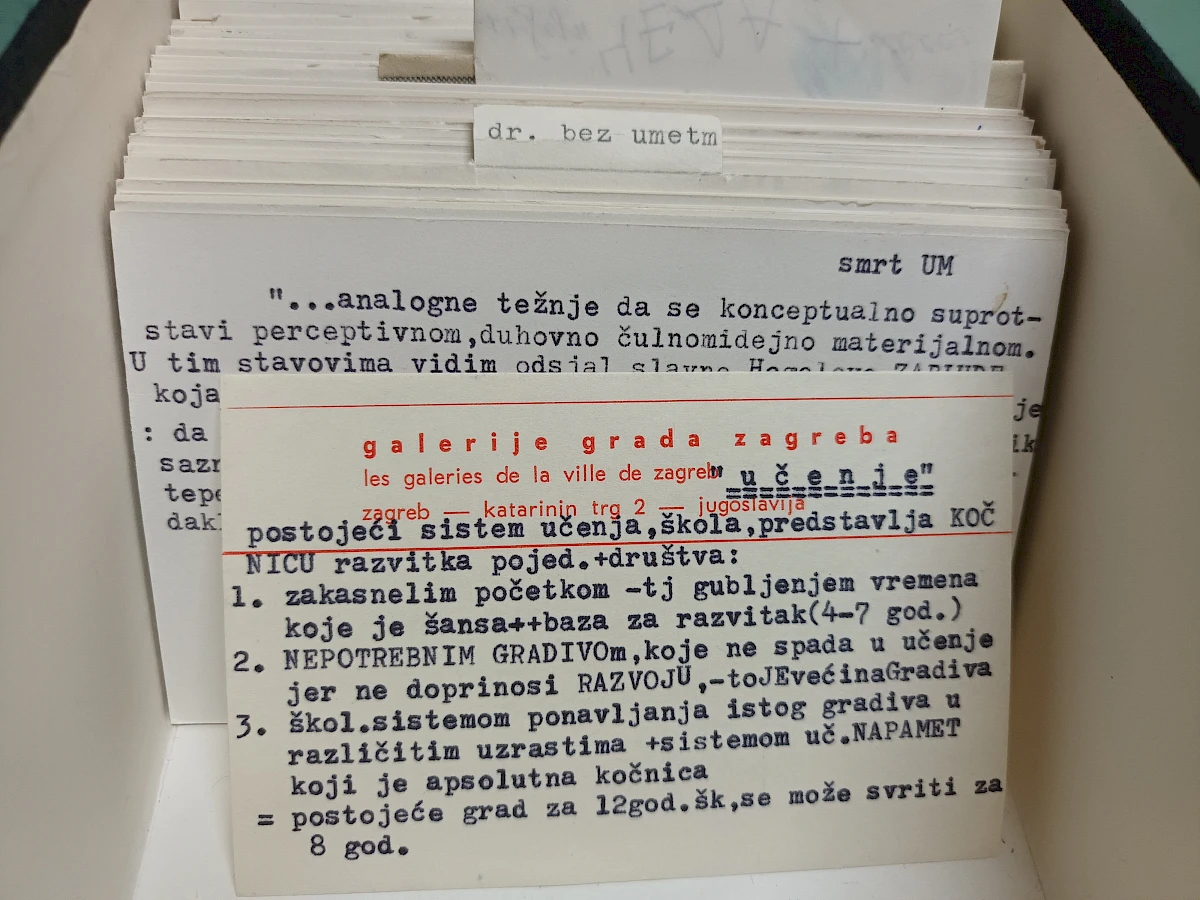
Dimitirije Bašičević Mangelos, Notes, 1970s. Courtesy of Mario Bruketa and Museum of Contemporary Art Zagreb.
Notes
Glossary of Common Knowledge (GCK)
Prior to its two editions, the Glossary of Common Knowledge (GCK) was described as a compilation of art terminology that differed significantly from what was found in existing art literature. It has been a nine-year research project carried out by Moderna galerija (MG+MSUM) within the framework of L'Internationale. In collaboration with institutions and individuals from Europe and other parts of the world, over 100 contributors/narrators proposed terms related to their own practices and contexts, historical references, political or social situations, or L'Internationale projects. The terms were discussed and defined around six referential fields (Historicization, Subjectivisation, Geopolitics I, Geopolitics II, Constituencies, Commons and Other Institutionalities). The first volume of terms was published as a book in 2018, and the second volume in 2022. The books follow the referential fields in six chapters. The narrators created a plurality of voices and narratives that examine the proposed terms and add their different perspectives from Europe and elsewhere, bringing with them overlooked and suppressed knowledge as well as different categories of thought and memory. This method allowed for different ways of participating, sharing and using the knowledge and collaborating trans-globally. The Glossary of Common Knowledge was curated by Zdenka Badovinac, Bojana Piškur and Jesús Carrillo.
Participants
Keynote speakers:
Leonida Kovač, Associate Professor at the University of Zagreb Academy of Fine Arts
Tomaž Mastnak, Emeritus Director of Research at the Institute of Philosophy, Research Centre of the Slovene Academy of Sciences and Arts
Ovidiu Tichindeleanu, a philosopher and a cultural theorist, Tranzit, Bucharest
Invited participants and organisations:
Sezgin Boynik, Pykë-Presje. The platform Pykë-Presje from Prizren is focused on internationalist and revolutionary documents and archives, emphasising local histories of people's movements, gender emancipation and class consciousness that defy nation-state narratives.
Irfan Hošić, University of Bihać / KRAK Center. KRAK emerged from the specific political, social and cultural circumstances of the neglected industrial past, ethno-national conflict, post-war trauma, poverty and depopulation.
Natalija Vujošević, the Museum of Contemporary Art of Montenegro, Podgorica
Beti Žerovc, a professor at University of Ljubljana, Art History department
Crvena, Sarajevo, is an organisation focused on women's social position, production and management of natural and social resources, political decision-making, everyday life, work and neighbourhood relations, and art and creativity.
BLOK, Zagreb, is a curatorial collective that works on the democratisation of art and culture and the articulation of resistance to the processes of their privatisation through production and research of socially engaged art, publishing, political and artistic education, and cultural workers organising.
Krater, Ljubljana is a temporary production space that emerged from an abandoned, crater-like construction site near the centre of Ljubljana. It functions as a prototype mechanism for the regeneration of the earth's surface, creating new worlds on the ruins of urban ecosystems.
Živi atelje DK, Zagreb – “Živi,” or Living, refers to a living organism that develops, communicates, adapts itself and shapes the environment. “Atelje,” or Atelier, is a center of creation, experiment, comradeship and collaboration. “DK” refers to the initials of the surname of the artist and academic sculptor, Vera Dajht-Kralj, whose heritage represents inspiration and the axis around which the collective’s activites are based.
L’internationale community participants:
Nick Aikens, L’Internationale
Zdenka Badovinac, SCK curator
Marco Baravalle, IRI, Venezia
Manuel Borja Villel, L’Internationale Association
Sara Buraya Bonet, Reina Sofia, Madrid
Charles Esche, Van Abbemuseum, Eindhoven
Sabel Gavaldon, MACBA, Barcelona
Jasna Jakšić, MSU, Zagreb
Bojana Piškur, MG+MSUM, Ljubljana
Ana Škegro, MSU, Zagreb
Mabel Tapia, L’Internationale Association
Related activities
The Soils Project
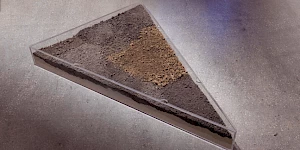
The Soils Project, is part of the eponymous, long term research initiative involving Tarrawara Museum of Art, Wurundjeri Country, Australia, the Van Abbemuseum in Eindhoven, Netherlands and Struggles for Sovereignty, a collective based in Yogyakarta, Indonesia. It works through specific and situated practices that consider soil, as both metaphor and matter. A further iteration of the project will open at the Van Abbemuseum in May - September 2024 as part of Museum of the Commons.
The Soils Project has been in development since 2018. An international collaboration between three organisations, and several artists, curators, writers and activists, the project has manifested in various iterations over several years including a three-part public webinar series titled The Soils Project: groundwork, and a two-week workshop, titled The Soils Project: On Country, for participating curators and artists. With a curatorium comprising arts workers from TarraWarra Museum of Art, the Van Abbemuseum, and Struggles for Sovereignty, the project’s approach seeks and facilitates opportunities to listen to diverse voices and perspectives around notions of caring for land, soil and sovereign territories.
Developed from this journey, The Soils Project’s forthcoming exhibition will embrace the deep histories of each participant’s location, examining the multiplicity of landscapes and environments, and the impact of colonisations and global industries on cultural heritage, land management and traditional knowledges.
Maria Lugones Decolonial Summer School
Recalling Earth: Decoloniality and Demodernity
Course Directors: Prof. Walter Mignolo & Dr. Rolando Vázquez
Recalling Earth and learning worlds and worlds-making will be the topic of chapter 14th of the María Lugones Summer School that will take place at the Van Abbemuseum in Eindhoven.
Red, Green, Black and White
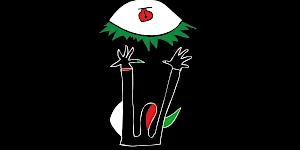
A performative inquiry by Institute of Radical Imagination and MSU Zagreb
Summer School: Our Many Easts
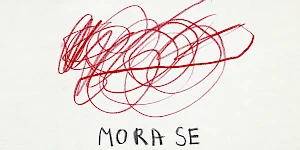
Our Many Easts summer school is organised by Moderna galerija in Ljubljana in partnership with ZRC SAZU (the Research Centre of the Slovenian Academy of Sciences and Arts) as part of the L’Internationale project Museum of the Commons.
Open Call – Summer School: Our Many Easts

Our Many Easts summer school takes place in Ljubljana 24–30 August and the application deadline is 15 March. Courses will be held in English and cover topics such as the legacy of the Eastern European avant-gardes, archives as tools of emancipation, the new “non-aligned” networks, art in times of conflict and war, ecology and the environment.
Open Call – School of Common Knowledge
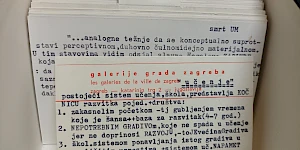
MSU (Zagreb), Van Abbemuseum (Eindhoven), MG+MSUM (Ljubljana), ZRC SAZU (Ljubljana) and L'Internationale invite applications for the new School of Common Knowledge (SCK) to be held in Zagreb and Ljubljana 24–29 May 2024. The School of Common Knowledge draws on the network, knowledge and experience of the L’Internationale museum confederation. Its ambition is to be both nomadic and situated, looking at specific cultural and geopolitical situations while exploring their relations and interdependencies with the rest of the world. The SCK is built on the basis laid by the Glossary of Common Knowledge project initiated by Zdenka Badovinac and Moderna galerija (Ljubljana) and continues its co-learning methodology.
Related contributions
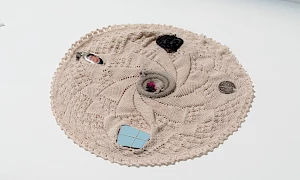
Decolonial aesthesis: weaving each other
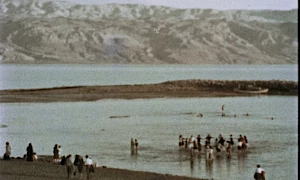
The Kitchen, an Introduction to Subversive Film with Nick Aikens, Reem Shilleh and Mohanad Yaqubi
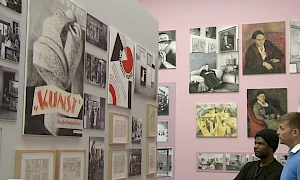
A dialogical tour through the exhibition The Making of Modern Art
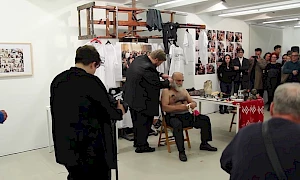
Performances from the opening of The Heritage of 1989. Case Study: The Second Yugoslav Documents Exhibition
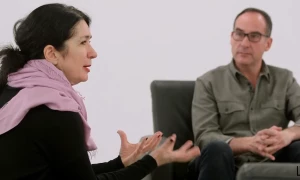
Epistemologies of the South
Art Museums and Democracy
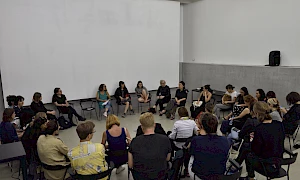
»We should never abandon the possibility of our active presence«
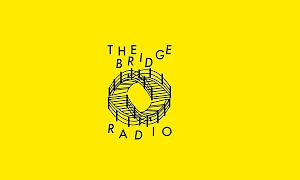
Our Movements Are Loud
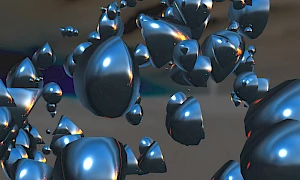
Tuning, Bias, and the Wild Beyond
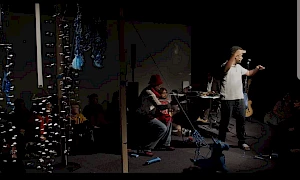
How to prepare for a hurricane, pt. 2
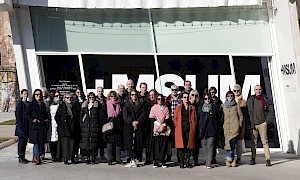
Museums under Political Control
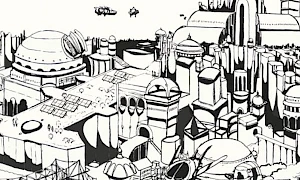
Indra's Web
